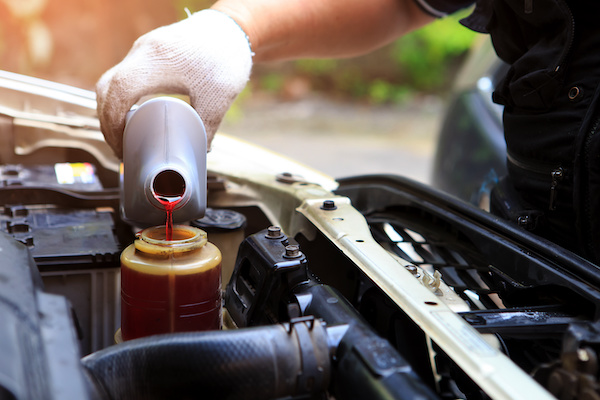

The six fluids you should check regularly are engine oil, coolant (Antifreeze), power steering fluid, brake fluid, transmission fluid (in an automatic transmission vehicle, not a manual), and windshield washer fluid. By regularly checking these and watching out for unusual odors, noises, or vibrations you can improve vehicle longevity, gas mileage, and resell value! But if you find yourself asking what exactly each of these fluids does and how often you should be checking them you came to the right place!
When is it Best to Check the Fluid Levels?
A good rule of thumb is to schedule an oil change every 3,000miles (6,000 if using synthetic oil) and check all the other fluids at the same time. If you schedule an oil change at Luke’s Auto Service, we will routinely check all fluids, tire pressure, and other general maintenance.
What Does Each of These Fluids Do?
Engine Oil

Engine oil ensures that the engine’s parts stay lubricated and are able to move in unison. Driving with no (or low) oil can cause severe damage to your engine.
That’s why it’s important to bring your car in for an oil change every 3,000 miles (6,000 for synthetic oil). If you want to check your oil yourself, make sure that your vehicle is parked on level ground and that the engine is cold. This will help ensure you get an accurate measurement.
Transmission Fluid
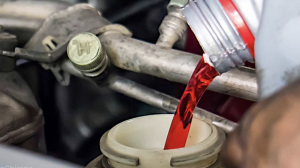
Transmission fluid lubricates and cools important parts of the transmission including clutches, gears, and valves. When it is low, it can cause difficulty shifting and uncontrolled surging.
Though some may think transmissions are a “lifetime” fluid that never needs to be replaced, that is not true. It’s a good idea to check your transmission fluid regularly. Check your owner’s manual for this procedure, as all manufacturers are different.
Coolant
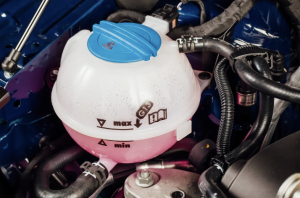
During the hot summer months, coolant, or antifreeze, keeps the engine cool. During the winter months, it prevents it from freezing. Coolant also helps prevent corrosion. Antifreeze deteriorates over time and is one of the more important fluids to check in a car, but be sure to check coolant levels when the vehicle engine is cold.
Brake Fluid
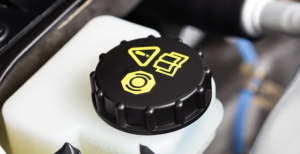
When you step on the brake pedal, it activates the brake plunger, within the master cylinder. The pressure pushes the brake fluid out of its reservoir inside the brake lines, which causes the brake pads to slow your car. As your brake pads wear, your brake fluid level usually goes down.
Keep in mind, your brakes should be quick and responsive. If this is far from the case, or you’ve noticed a sudden change in the performance of your brakes, your vehicle’s brakes need to be serviced. Brake fluid absorbs moisture and should be changed or flushed at the recommended manufacturer service intervals.
Power Steering Fluid
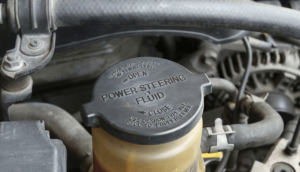
Simply put, power steering fluid is the fluid used in the power steering system to create a hydraulic link between the steering wheel and the front wheels, making it easier to turn. In addition, power steering fluid lubricates the moving parts of the steering system, allowing for optimal performance.
Just like the other fluids in your vehicle, power steering fluid should be checked regularly. If a low level is noticed, the system should be inspected for leaks.
Windshield Washer Fluid
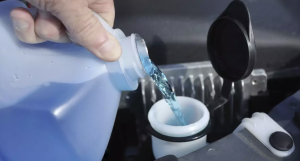
Considering how essential a clear windshield is to safe driving, the washer fluid, compared with other car fluids, it is often neglected. If you spray it frequently, check it whenever you get gas.
Consult your owner manual for specific amounts and instructions for fluid types that are recommended for your vehicle.
Running your vehicle with low or no fluids can be dangerous to you or anyone sharing the road with you. It can also result in a costly repair, lower power, and fuel economy, and may lead to a decreased vehicle value. If you suspect an issue while checking your vehicle fluids or are having any concerns, please contact us. Luke’s Auto Service in Essex County, NJ would be happy to check and top off your engine oil, coolant, power steering fluid, brake fluid, transmission fluid, and windshield washer fluid!
Images:
References:
